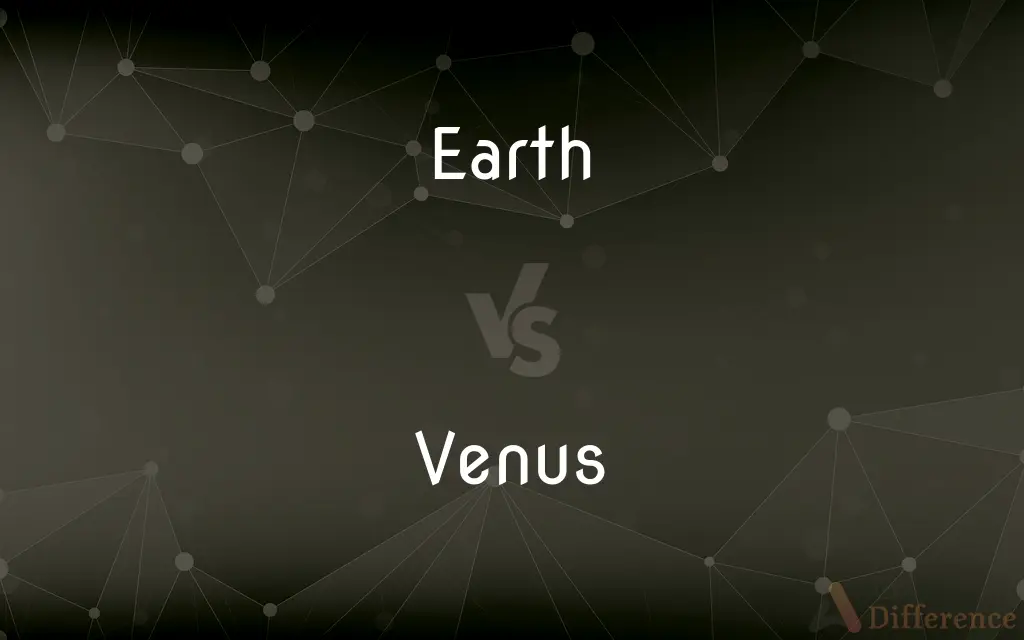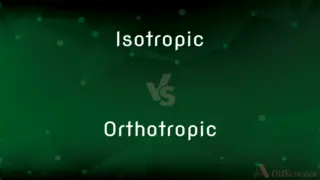Earth vs. Venus — What's the Difference?
By Tayyaba Rehman — Updated on September 25, 2023
Earth is our home planet with diverse life and water; Venus, often termed Earth's "sister planet," is a scorching, volcanic world with thick clouds of sulfuric acid.

Difference Between Earth and Venus
Table of Contents
ADVERTISEMENT
Key Differences
Earth and Venus, both terrestrial planets in our solar system, have distinct characteristics. Earth, unique among planets, supports a vast diversity of life due to its hospitable conditions and presence of water. Its atmosphere is primarily composed of nitrogen and oxygen, enabling humans and countless other species to thrive.
Venus, on the other hand, is sometimes called Earth's "sister planet" because of its similar size and proximity. However, conditions on Venus are far from sisterly. The planet has a thick atmosphere comprised mainly of carbon dioxide, with clouds of sulfuric acid. This composition, paired with its proximity to the sun, results in an intense greenhouse effect, making it hotter than Mercury, the closest planet to the sun.
Water, which is abundant on Earth in all its forms, is absent on Venus due to its high temperatures. Earth's blue oceans cover about 71% of its surface, playing a vital role in regulating the planet's climate and supporting life. Venus lacks this crucial element, with a dry, rocky terrain and active volcanoes dominating its landscape.
Additionally, Earth has a strong magnetic field, protecting it from harmful solar radiation. Venus, in contrast, doesn't have such a protective shield. The differences between Earth and Venus are profound, highlighting the unique nature of each celestial body within our solar system.
Comparison Chart
Atmospheric Composition
Primarily nitrogen and oxygen.
Mainly carbon dioxide with clouds of sulfuric acid.
ADVERTISEMENT
Surface Temperature
Average around 59°F (15°C).
Average around 867°F (464°C).
Water Presence
Abundant, covering 71% of the surface.
Virtually absent, due to high temperatures.
Magnetic Field
Strong, protects from solar radiation.
Very weak, offers little protection.
Life
Supports diverse life forms.
No known life, extremely hostile conditions.
Compare with Definitions
Earth
The third planet from the sun in our solar system.
Earth is the only known planet to support life.
Venus
Termed Earth's "sister planet" due to its similar size.
Despite being called a sister planet, Venus has extremely different conditions from Earth.
Earth
A terrestrial body with vast oceans and diverse ecosystems.
Earth's biodiversity is unparalleled in the known universe.
Venus
A symbol of love and beauty in Roman mythology.
In ancient times, Venus was worshipped as the goddess of love.
Earth
The ground or soil as a surface.
She planted the seeds deep in the earth.
Venus
An evening or morning star when visible from Earth.
Tonight, you can see Venus shining brightly as the evening star.
Earth
Our world; the human sphere of existence or society.
Technological advancements have changed the face of the earth.
Venus
The second planet from the sun in our solar system.
Venus is often visible from Earth just after sunset.
Earth
Earth is the third planet from the Sun and the only astronomical object known to harbor and support life. About 29.2% of Earth's surface is land consisting of continents and islands.
Venus
A world with extreme temperatures and a thick atmosphere.
The surface of Venus can melt lead because of its high temperature.
Earth
The planet on which we live; the world
The diversity of life on earth
Venus
Venus is the second planet from the Sun. It is named after the Roman goddess of love and beauty.
Earth
The substance of the land surface; soil
A layer of earth
Venus
Roman Mythology The goddess of love and beauty.
Earth
Electrical connection to the ground, regarded as having zero electrical potential.
Ensure metal fittings are electrically bonded to earth
Venus
The second planet from the sun, having an average radius of 6,052 kilometers (3,761 miles), a mass 0.82 times that of Earth, and a sidereal period of revolution about the sun of 224.7 days at a mean distance of approximately 108.2 million kilometers (67.2 million miles).
Earth
The underground lair of a badger or fox.
Venus
Any of the bivalve molluscs in the genus Venus or family Veneridae.
Earth
Connect (an electrical device) with the ground
The front metal panels must be soundly earthed
Venus
The goddess of beauty and love, that is, beauty or love deified.
Earth
Drive (a fox) to its underground lair.
Venus
One of the planets, the second in order from the sun, its orbit lying between that of Mercury and that of the Earth, at a mean distance from the sun of about 67,000,000 miles. Its diameter is 7,700 miles, and its sidereal period 224.7 days. As the morning star, it was called by the ancients Lucifer; as the evening star, Hesperus.
Earth
Cover the root and lower stem of a plant with heaped-up earth
The stems can be earthed up when the plant is about one foot high
Venus
The metal copper; - probably so designated from the ancient use of the metal in making mirrors, a mirror being still the astronomical symbol of the planet Venus.
Earth
The land surface of the world.
Venus
Any one of numerous species of marine bivalve shells of the genus Venus or family Veneridæ. Many of these shells are large, and ornamented with beautiful frills; others are smooth, glossy, and handsomely colored. Some of the larger species, as the round clam, or quahog, are valued for food.
Earth
The softer, friable part of land; soil, especially productive soil.
Venus
The second nearest planet to the sun; visible as an early `morning star' or an `evening star'; rotates slowly clockwise (in the opposite direction from the normal rotation of the planets);
Before it was known that they were the same object the evening star was called Venus and the morning star was called Lucifer
Earth
OftenEarthThe third planet from the sun, having a sidereal period of revolution about the sun of 365.26 days at a mean distance of approximately 149.6 million kilometers (92.96 million miles), a sidereal rotation period of 23 hours 56.07 minutes, an average radius of 6,378.1 kilometers (3,963 miles), and a mass of approximately 5.9736 × 1024 kilograms (1.3169 × 1025 pounds).
Venus
Goddess of love; counterpart of Greek Aphrodite
Earth
The realm of mortal existence; the temporal world.
Venus
Type genus of the family Veneridae: genus of edible clams with thick oval shells
Earth
The human inhabitants of the world:The earth received the news with joy.
Earth
Worldly affairs and pursuits.
Earth
Everyday life; reality:was brought back to earth from his daydreams of wealth and fame.
Earth
The substance of the human body; clay.
Earth
The lair of a burrowing animal.
Earth
Chiefly British The ground of an electrical circuit.
Earth
(Chemistry)Any of several metallic oxides, such as alumina or zirconia, that are difficult to reduce and were formerly regarded as elements.
Earth
To cover or heap (plants) with soil for protection.
Earth
To chase (an animal) into an underground hiding place.
Earth
To burrow or hide in the ground. Used of a hunted animal.
Earth
Senseid|en|Q2}} {{alternative case form of Earth; Our planet, third out from the Sun.
The astronauts saw the earth from the porthole.
Earth
(uncountable) Soil.
This is good earth for growing potatoes.
Earth
(uncountable) Any general rock-based material.
She sighed when the plane's wheels finally touched earth.
Earth
The ground, land (as opposed to the sky or sea).
Birds are of the sky, not of the earth.
Earth
(British) A connection electrically to the earth (US ground); on equipment: a terminal connected in that manner.
Earth
The lair or den (as a hole in the ground) of an animal such as a fox.
Earth
A region of the planet; a land or country.
Earth
Worldly things, as against spiritual ones.
Earth
The world of our current life (as opposed to heaven or an afterlife).
Earth
(metonymically) The people on the globe.
Earth
Any planet similar to the Earth (our earth): an exoplanet viewed as another earth, or a potential one.
New space telescopes may accelerate the search for other earths that may be out there.
Earth
(archaic) The human body.
Earth
The aforementioned soil- or rock-based material, considered one of the four or five classical elements.
Earth
Any of certain substances now known to be oxides of metal, which were distinguished by being infusible, and by insolubility in water.
Earth
To connect electrically to the earth.
That noise is because the amplifier is not properly earthed.
Earth
(transitive) To bury.
Earth
(transitive) To hide, or cause to hide, in the earth; to chase into a burrow or den.
Earth
(intransitive) To burrow.
Earth
The globe or planet which we inhabit; the world, in distinction from the sun, moon, or stars. Also, this world as the dwelling place of mortals, in distinction from the dwelling place of spirits.
That law preserves the earth a sphereAnd guides the planets in their course.
In heaven, or earth, or under earth, in hell.
Earth
The solid materials which make up the globe, in distinction from the air or water; the dry land.
God called the dry land earth.
He is pure air and fire, and the dull elements of earth and water never appear in him.
Earth
The softer inorganic matter composing part of the surface of the globe, in distinction from the firm rock; soil of all kinds, including gravel, clay, loam, and the like; sometimes, soil favorable to the growth of plants; the visible surface of the globe; the ground; as, loose earth; rich earth.
Give him a little earth for charity.
Earth
A part of this globe; a region; a country; land.
Would I had never trod this English earth.
Earth
Worldly things, as opposed to spiritual things; the pursuits, interests, and allurements of this life.
Our weary souls by earth beguiled.
Earth
The people on the globe.
The whole earth was of one language.
Earth
Any earthy-looking metallic oxide, as alumina, glucina, zirconia, yttria, and thoria.
Earth
A hole in the ground, where an animal hides himself; as, the earth of a fox.
They [ferrets] course the poor conies out of their earths.
Earth
The connection of any part an electric conductor with the ground; specif., the connection of a telegraph line with the ground through a fault or otherwise.
Earth
A plowing.
Such land as ye break up for barley to sow,Two earths at the least, ere ye sow it, bestow.
Earth
To hide, or cause to hide, in the earth; to chase into a burrow or den.
Earth
To cover with earth or mold; to inter; to bury; - sometimes with up.
The miser earths his treasure, and the thief,Watching the mole, half beggars him ere noon.
Why this in earthing up a carcass?
Earth
To burrow.
Earth
The 3rd planet from the sun; the planet on which we live;
The Earth moves around the sun
He sailed around the world
Earth
The loose soft material that makes up a large part of the land surface;
They dug into the earth outside the church
Earth
The solid part of the earth's surface;
The plane turned away from the sea and moved back over land
The earth shook for several minutes
He dropped the logs on the ground
Earth
The abode of mortals (as contrasted with heaven or hell);
It was hell on earth
Earth
Once thought to be one of four elements composing the universe (Empedocles)
Earth
The concerns of the world as distinguished from heaven and the afterlife;
They consider the church to be independent of the world
Earth
A connection between an electrical device and the earth (which is a zero voltage)
Earth
Hide in the earth like a hunted animal
Earth
Connect to the earth;
Earth the circuit
Earth
A connection to the ground in electrical systems.
Ensure the device is earthed to prevent electric shocks.
Common Curiosities
Can we live on Venus?
No, Venus's extreme temperatures and toxic atmosphere make it uninhabitable.
Are Earth and Venus the same size?
They are similar in size, but Earth is slightly larger.
Does Venus have life like Earth?
Currently, there's no evidence of life on Venus; its conditions are extremely hostile.
Which planet has a strong magnetic field: Earth or Venus?
Earth has a strong magnetic field, while Venus's is very weak.
Is Venus closer to the sun than Earth?
Yes, Venus is the second planet, while Earth is the third.
Which planet is hotter: Earth or Venus?
Venus is hotter due to an intense greenhouse effect.
Why is Earth called the "Blue Planet"?
Because of its vast blue oceans that cover about 71% of its surface.
Does Earth have a thicker atmosphere than Venus?
No, Venus has a much thicker atmosphere compared to Earth.
Why is Venus sometimes visible from Earth?
Venus reflects sunlight effectively and is close to Earth, making it visible at certain times.
What role does water play on Earth compared to Venus?
On Earth, water supports life and regulates climate. Venus lacks significant water.
Share Your Discovery

Previous Comparison
Isotropic vs. Orthotropic
Next Comparison
Love vs. ObsessionAuthor Spotlight
Written by
Tayyaba RehmanTayyaba Rehman is a distinguished writer, currently serving as a primary contributor to askdifference.com. As a researcher in semantics and etymology, Tayyaba's passion for the complexity of languages and their distinctions has found a perfect home on the platform. Tayyaba delves into the intricacies of language, distinguishing between commonly confused words and phrases, thereby providing clarity for readers worldwide.














































